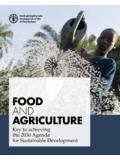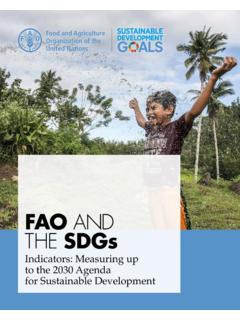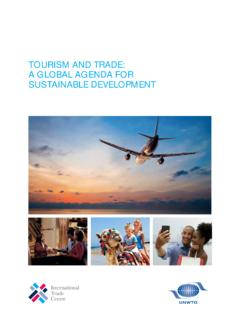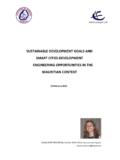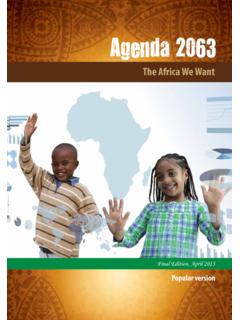Transcription of A NEW DAC: INNOVATIONS FOR THE 2030 …
1 DAC HIGH LEVEL MEETING 30-31 October 2017 OECD Conference Centre, Paris A NEW DAC: INNOVATIONS FOR the 2030 agenda . DAC HIGH LEVEL COMMUNIQU : 31 OCTOBER 2017. 1. We, the Members and Participants 1 of the OECD development Assistance Committee (DAC), convened at high level in Paris on 30-31 October 2017. In the spirit of inclusiveness, we are grateful to the partners beyond our membership 2 who participated in and enriched our deliberations today. Two years since the adoption of the 2030 . agenda for Sustainable development , development co-operation continues to play a crucial role in helping place the world on a sustainable path. We reaffirm the important contribution of Official development Assistance (ODA) to sustainable development and the pledge to leave no one behind. 2. The challenges to sustainable development whether related to poverty, inequalities, climate change, conflict, violent extremism, or corruption threaten to undermine development gains.
2 Complex challenges increasingly require coherent approaches at all levels and co-ordinated, inclusive actions. We will promote policy coherence for sustainable development , ensure development effectiveness, and work to strengthen gender equality and women's empowerment as well as conflict sensitivity through effective partnerships in order to better find holistic solutions to those challenges. We will also gather better data and evidence to mobilise more resources and improve the effectiveness of our support to achieve development results while respecting developing countries' own development agendas and country-led approaches. We remain committed to improving the quality and impact of our development co-operation policies, both individually and collectively through the DAC. 3. The DAC's vision (see Annex IV) is to champion the 2030 agenda , in particular the Addis Ababa Action agenda (AAAA), and policy coherence for sustainable development globally and within the OECD.
3 As a unique and relevant body in the global development co-operation architecture, the DAC remains the guardian of the integrity and definition of ODA and will transform itself to better promote development co-operation and policy coherence for sustainable development through inclusive dialogues. To contribute to the implementation of the 2030 agenda in its three dimensions (social, environmental, and economic), we aim to improve the quality, results and impact of development co- operation while upholding the integrity of ODA; leverage and catalyse the necessary financing and resources; and apply the principles for effective development co-operation, including the commitment to the New Deal for Engagement in Fragile States in the context of the 2030 agenda 3. 4. We thank the High Level Panel on the Future of the development Assistance Committee 4, whose report 5. provided thoughtful and insightful suggestions for transforming the DAC into a more robust, responsive, transparent and inclusive institution.
4 We will provide an update in January 2018 on the measures taken to implement any recommendations and make a public report available online. 1 Qatar and the United Arab Emirates are the current Participants of the DAC. 2 Representatives from OECD accession countries (Colombia, Costa Rica, Lithuania), key partners (Brazil, India, Indonesia, and South Africa), and non-DAC OECD members (Chile, Estonia, Israel, Latvia, Mexico, and Turkey) attended the High Level Meeting as observers. Also present were representatives from the Bill and Melinda Gates Foundation, the DAC-CSO Reference Group, the International Monetary Fund, OECD Business and Industry Advisory Committee (BIAC), the OECD Trade Union Advisory Committee (TUAC), the United Nations, the World Bank, and the private sector (Danone). 3 International Dialogue on Peacebuilding and Statebuilding (2016), Stockholm Declaration on Addressing Fragility and Building Peace in a Changing World, 5 April 2016.
5 4 Established at the 2016 High Level meeting, the Panel was chaired by Ms Mary Robinson and composed of 17 members. 5 1. 5. While the DAC continues to focus on its core strengths, we have identified six main strategic priorities in transforming the Committee to ensure it is fit for purpose to respond to the realities of the 2030 agenda : (i) focus on fostering development impact and mobilising resources; (ii) learn from existing development approaches; (iii) explore new development approaches; (iv) reach out to development actors beyond its Membership to influence and be influenced; (v) increase transparency, proactively self-assess and hold itself to account; and (vi) work in effective governance, systems and structures. At the heart of this transformation, we adopt a new mandate for the DAC (see Annex III) which has an overarching objective of promoting development co-operation so as to contribute to implementation of the 2030 agenda , through inclusive and sustainable economic growth, poverty eradication, improvement of living standards in developing countries, and to a future in which no country will depend on aid.
6 This will require efforts to address shared objectives including the use of innovative tools and instruments, outreach, and civil society engagement. In this regard, the DAC's subsidiary bodies and networks remain central for the work of the DAC. and in advancing this reform. Furthermore, in light of the 2017 OECD Ministerial Council Meeting commitment 6 to an ongoing OECD-wide Standard-Setting: Review of OECD Legal Instruments and where relevant, we will consider reviewing and updating our standards, policy benchmarks, and legal instruments. 6. In line with the DAC transformative agenda and vision, we will revise our Global Relations Strategy to foster inclusive policy dialogues and triangular co-operation, learn from partners' experiences, and engage in innovative ways with new development actors, building on the work of the Global Partnership for Effective development Co-operation (GPEDC). The Secretariat will facilitate the DAC's continued engagement with key stakeholders including partner countries, emerging economies, international development actors, the UN system, civil society and the private sector and other Committees within the OECD.
7 7. Innovation is an essential enabler for both improved development co-operation practices and quick and effective responses to development co-operation challenges. We intend to gather evidence, facilitate and encourage the sharing of good practices and experiences, foster platforms on innovative policies, tools and practices so that DAC. members can increase their knowledge and implement innovative programming that delivers humanitarian and development impact in ways that are better than existing approaches. In order to do so, we intend to embrace a broad view of innovation including finance and technologies as well as new policies, partnerships, business models, practices, approaches, behavioural insights and methods of development co-operation across all sectors, and consider means to identify and promote development innovation. 8. We will actively support the implementation of the AAAA and the UN-led Financing for development process.
8 In this context, we are committed to better supporting integrated financing and policy pathways across development finance. We will approach these issues holistically, in a transparent and accountable manner, integrating our efforts through mobilisation, impact, and transformation and call upon the OECD to serve as a space for policy dialogue, evidence gathering and analysis on financing for development , collaborating with other relevant stakeholders and organisations. We will continue to uphold DAC statistics as the authoritative source for internationally relevant, accurate, credible and comparable data on development finance. 9. We reaffirm our respective ODA commitments including those of us who have endorsed the UN targets of per cent of Gross National Income (GNI) as ODA to developing countries and per cent of GNI as ODA. towards Least Developed Countries and decide to continue to make all efforts to achieve them, taking into account our specific circumstances.
9 We welcome the ongoing effort by the membership to develop and implement policy actions on reversing the declining trend of ODA to countries most in need, such as least developed countries, low-income countries, small island developing states, land-locked developing countries, and fragile and conflict-affected contexts. We recognise that many factors contribute to a provider's decisions on allocations to partner countries. 10. At our 2012 meeting, we launched a process to modernise ODA and agreed to create a new measure of total official support for sustainable development to help ensure that the right incentive frameworks, and financing and investment tools, are in place to support all countries achieve a successful financing for sustainable development and strengthened impact at country level. At our 2014 and 2016 meetings, we took a series of decisions to modernise ODA. with regard to the measurement of concessional loans to the public sector, private sector instruments (PSI), and peace and security expenditures.
10 We also acknowledged the necessity to improve the consistency, comparability, and 6 See paragraph 18: 2. transparency of our reporting of ODA-eligible in-donor refugee costs, by aligning the respective methods for calculating these costs. We will prioritise the finalisation of the current work on ODA modernisation and consider further appropriate work to contribute to the realisation of the 2030 agenda . 11. We welcome the progress in developing the new statistical measurement framework, Total Official Support for Sustainable development (TOSSD), which complements but does not replace ODA. We will continue to develop its content through an open, inclusive and transparent consultative process. In this regard, we take note of the establishment of an informal, international TOSSD Task Force, in concert with the UN Statistical Commission and the Inter-Agency Task Force on Financing for development and relevant UN bodies. We take note of the importance of the next meeting of the UN Statistical Commission in March 2018, and support continued collaboration with relevant UN.










